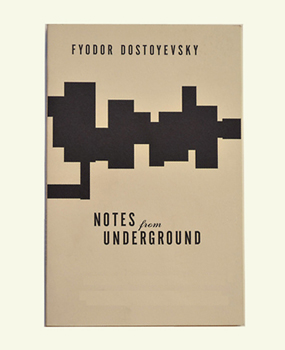....And
who can tell, perhaps the purpose of man's life on earth consists precisely
in this uninterrupted striving after a goal. That is to say, the purpose
is life itself and not the goal which, of course, must be nothing but
twice two makes four. And twice two, ladies and gentleman, is no longer
life but the beginning of death. At least, man has always feared this
twice two makes four, and it's what I'm afraid of now. |
....Let's
assume that man does nothing but search for this twice two, that he crosses
oceans and sacrifices his life in this quest, while, all the time, he
is really afraid of finding that it does make four. He feels that once
he has discovered it, he'll have nothing left for which to search. The
workers, at least, when they receive their money at the end of the week,
go to a tavern and then, perhaps, land in a police station, so there's
something to keep them busy. But otherwise, what is a man to do with himself
when he achieves one of his objectives? In any case, there is a visible
awkwardness in him every time he does. He loves the achieving, but does
not particularly enjoy what he achieves. Funny, isn't it? Yes, man is
a comical animal, and there's obviously a joke in all this. Still, I say
that twice two is an unbearable notion, an arrogant imposition. This twice
two image stands there, hands in pockets, in the middle of your road,
and spits in your direction. Nevertheless, I'm willing to agree that twice-two-makes-four
is a thing of beauty. But, if we're going to praise everything like that,
then I say that twice-two-makes-five is also a delightful little item
now and then.
|
....And
what makes you so cocksure, so positive that only the normal and the
positive, that is, only what promotes man's welfare, is to his advantage?
Can't reason also be wrong about what's an advantage? Why can't man
like things other than his well-being? Maybe he likes suffering just
as much. Maybe suffering is just as much to his advantage as well-being.
In fact, man adores suffering. Passionately. It's a fact. For this,
there's no need even to go to world history. Just ask yourself, if you've
had any kind of experience of life. And, personally, I even feel that
it's shameful to like just well-being by itself. Right or wrong, it's
very pleasant to break something from time to time.
|
....I
know, for instance, that suffering is inadmissible in light stage plays.
In the utopian crystal palace, it'd be inconcievable, for suffering means
doubt and denial, and what kind of crystal palace would that be, if people
had doubts about it? Nevertheless, I'm certain that man will never give
up true suffering, that is, chaos and destruction. Why, suffering is the
only cause of consciousness. And, although I declared at the beginning
that consciousness is man's greatest plague, I know that he likes it and
won't exchange it for any advantage. Consciousness, for instance, is of
a much higher order than twice two. After twice two, we'll of course have
nothing left either to do or to find out. All that'll be left for us will
be to block off our five senses and plunge into contemplation. With consciousness
we have nothing much to do either, but we can at least lacerate ourselves
from time to time, which does liven us up a bit. It may go against progress,
but it's better than nothing. |


